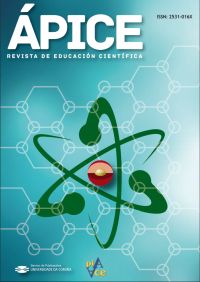Process indicators in metacognitive regulation while reading science texts
Main Article Content
Abstract
The present work aimed at analyzing the actions made when readers try to monitor their comprehension of science texts. University pre-service teachers read-and-judged the comprehensibility of manipulated texts having embedded inconsistencies which involved main ideas. Task was made individually on a computer and reader’s actions and result were registered using the software Read & Answer. In line with models for comprehension of information, and for monitoring some “process indicators” were proposed. These indicators were elaborated from the data registered by Read & Answer and proved to be high effective in discriminating correct from wrong outputs in the monitoring task.
Keywords:
Downloads
Article Details
References
Alexander, P. A. y Jetton, T. L. (2000). Learning from text: A multidimensional and developmental perspective. En M. L. Kamil, P. B. Mosenthal, P. D. Pearson y R. Barr (Eds.), Handbook of reading research, vol. 3 (chapter 19). New York: Routledge.
Baker, L. (1979). Comprehension monitoring: Identifying and coping with text confusions. Journal of Reading Behavior, 11(4), 365-374. Recuperado de: https://journals.sagepub.com/doi/pdf/10.1080/10862967909547342
Cerdán, R., Vidal-Abarca, E., Salmerón, L., Martínez, T. y Gilabert, R. (2009). Read & Answer, A tool to capture on-line processing of electronic texts. The Ergonomics Open Journal, 2, 133-140. Recuperado de: https://benthamopen.com/contents/pdf/TOERGJ/TOERGJ-2-133.pdf
Cowan, N. (2005). Working memory capacity. Hove, East Sussex, UK: Psychology Press.
Daneman, M. y Merikle, P. M. (1996). Working memory and language comprehension: A meta-analysis. Psychonomic bulletin & review, 3(4), 422-433. DOI: https://doi.org/10.3758/BF03214546
Dignath, C. y Büttner, G. (2008). Components of fostering self-regulated learning among students. A meta-analysis on intervention studies at primary and secondary school level. Metacognition and Learning, 3(3), 231-264. DOI: https://doi.org/10.1007/s11409-008-9029-x
Fensham, P. J., Gunstone, R. F. y White, R. T. (Eds.) (2013). The content of science: A constructivist approach to its teaching and learning. London, UK: Routledge.
Gromley, J.G. (2005). Metacognition, cognitive strategy instruction and reading in adult literacy. Hillsdole: Lawrence Erlbaum Association.
Huitema, J. S., Dopkins, S., Klin, C. M. y Myers, J. L. (1993). Connecting goals and actions during reading. Journal of Experimental Psychology: Learning, Memory, and Cognition, 19(5), 1053-1060. DOI: http://dx.doi.org/10.1037/0278-7393.19.5.1053
Kintsch, W. y van Dijk, T. (1978). Towards a model of text comprehension and production. Psychological Review, 85(5), 363-394. Recuperado de: http://www.discourses.org/OldArticles/Towards%20a%20model.pdf
Kintsch, W. (1998). Comprehension: A paradigm for cognition. Cambridge: Cambridge University Press.
Kolić‐Vehovec, S. y Bajšanski, I. (2007). Comprehension monitoring and reading comprehension in bilingual students. Journal of Research in Reading, 30(2), 198-211. DOI: https://doi.org/10.1111/j.1467-9817.2006.00319.x
Krasiejko, I. (2010). The role of metacognition in education. The New Educational Review, 20(1), 120-128. Recuperado de: http://selfregulation.pbworks.com/f/ Metacognition-Self+Regulation-Strategies.pdf
Nelson, T. y Narens, L. (1990). Metamemory: A theoretical framework and new findings. Psychology of Learning and Motivation, 26, 125-173. DOI: https://doi.org/10.1016/S0079-7421(08)60053-5
Otero, J., Campanario, J. y Hopkins, K. (1992). The relationship between academic achievement and metacognitive comprehension monitoring ability of Spanish secondary school students. Educational and Psychological Measurement, 52(3), 419-430. DOI: https://doi.org/10.1177/0013164492052002017
Otero, J. y Kintsch, W. (1992). Failures to detect contradictions in a text: What readers believe versus what they read. Psychological Science, 3(4), 229-236. DOI: https://doi.org/10.1111/j.1467-9280.1992.tb00034.x
Primativo S, Spinelli D, Zoccolotti P, De Luca, M. y Martelli M (2016) Perceptual and Cognitive Factors Imposing “Speed Limits” on Reading Rate: A Study with the Rapid Serial Visual Presentation. PLoS ONE 11(4). DOI: https://doi.org/10.1371/ journal.pone.0153786
Sánchez-Miguel, E. y García-Rodicio, H. (2014). Comprensión de textos: conceptos básicos y avances en la investigación actual. Aula, 20, 83-103. Recuperado de: http://revistas.usal.es/index.php/0214-3402/article/viewFile/12563/12912
Sanjosé, V., Fernández, J.J. y Vidal-Abarca, E. (2010). Importancia de las destrezas de procesamiento de la información en la comprensión de textos científicos. Infancia y Aprendizaje, 33(4), 529-541. DOI: https://doi.org/10.1174/ 021037010793139581
Sanjosé, V., Vidal-Abarca, E., Padilla, O.M. (2006). A connectionist extension to Kintsch’s Construction-Integration model. Discourse Processes, 42(1), 1-35.DOI: https://doi.org/10.1207/s15326950dp4201_1
Saux, G., Irrazabal, N. y Burin, D. I. (2014). Comprensión de textos de ciencias en estudiantes universitarios: generación de inferencias causales durante la lectura. Liberabit, 20(2), 305-313. Recuperado de: http://www.scielo.org.pe/ pdf/liber/v20n2/a11v20n2.pdf
Sereno, S. C., Rayner, K. y Posner, M. I. (1998). Establishing a time-line of word recognition: evidence from eye movements and event-related potentials. Neuroreport, 9(10), 2195-2200. DOI: http://dx.doi.org/10.1097/00001756-199807130-00009
Van der Schoot, M., Reijntjes, A. y van Lieshout, E. C. (2012). How do children deal with inconsistencies in text? An eye fixation and self-paced reading study in good and poor reading comprehenders. Reading and Writing, 25(7), 1665-1690. DOI: https://doi.org/ 10.1007/s11145-011-9337-4
Veenman, M., Wilhelm, P. y Beishuizen, J. (2004). The relation between intellectual and metacognitive skills from a developmental perspective. Learning and Instruction, 14(1), 89-109. DOI: https://doi.org/10.1016/j.learninstruc.2003.10.004
Vosniadou, S., Pearson, P. D. y Rogers, T. (1988). What causes children's failures to detect inconsistencies in text? Representation versus comparison difficulties. Journal of educational psychology, 80(1), 27-39. DOI: http://dx.doi.org/10.1037/0022-0663.80.1.27
Wang, M., Haertel, G. y Walberg, H. (1993). Toward a knowledge base for school learning. Review of Educational Research, 63(3), 249-294. DOI: https://doi.org/10.3102/00346543063003249


